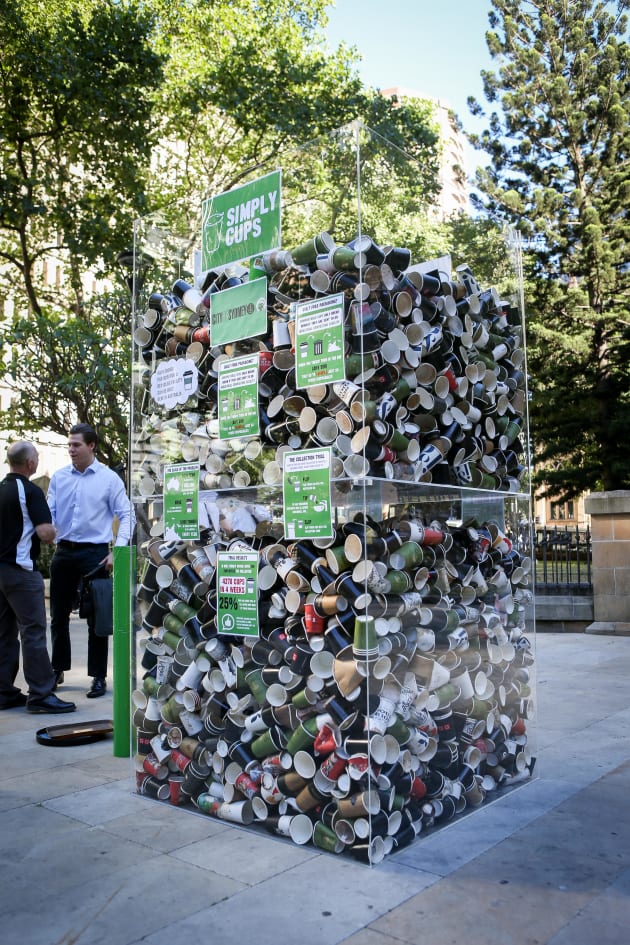Australians drink a lot of takeaway coffee. According to Planet Ark statistics, 100 million cups of coffee are sold a year in the City of Sydney alone. A University of Queensland study puts the national figure at one billion per annum, although numbers as high as 3.2 billion have been cited.
And while Australians embrace our coffee-cafe culture, we're also confused about what to do with our empty takeaway cups.
One-way coffee cups, by nature of their paper-plus-plastic-liner composition, are not recyclable in our current recycling systems and not easy to separate from the waste stream.
In a typical MRF (material recovery facility), coffee cups move through the recycling sorting process just like cardboard, but the liquid-proof polyethylene inner liner prevents them from being recycled. In fact, they can contaminate the cardboard waste stream and so recyclers send them to land-fill where, it's estimated, they take 50 years to decompose.
So what's the solution? Recycle the cups separately to produce a material that has a commercial end-use. But of course, it's not that simple.
The first challenge is collection of cups as a single waste stream. Will consumers make the effort to dispose of their cups separately?
The second is creating an economically feasible collection and recycling program. Will collected waste volumes and recycled product output be sufficient to support a sustainable business model?
A company called Closed Loop Environmental Solutions has answers to the first challenge and is currently investigating the second. It also has access to the technology that would reprocess the cups into a durable plastic-fibre compound with numerous potential end uses.
Closed Loop recently conducted a trial in the major Eastern Seaboard capital cities of Sydney, Melbourne and Brisbane, with support funding from the City of Sydney, Australian Packaging Covenant Organisation (APCO), and Queensland Government respectively.
The trial saw separate bins for takeaway coffee cups introduced in three office buildings, and the results show that consumers would indeed do the right thing with their used coffee cups.
In the Melbourne trial, an office building housing 750 workers collected 3561 coffee cups over four weeks. In Sydney, 780 workers disposed of 4278 coffee cups in the collection bins over the four-week period. (At the time of writing, the Brisbane results had not been released).
The results are encouraging. City of Sydney Mayor Clover Moore said if this trial was replicated at offices across the City of Sydney area, more than 25 million coffee cups (or close on 270 million tonnes of recyclable material) could be diverted from landfill every year.
While the trial has confirmed the viability of a coffee cup collection system in urban areas, the next step is to make a business case for a specialised coffee cup recycling facility.
MD of Closed Loop Environmental Solutions, Robert Pascoe, said that this model has been successfully executed by Closed Loop in the UK, where its Simply Cups program has now collected more than seven million cups and has established a viable recycling program.
This has driven the development of new recycling technology, Pascoe explained.
“In partnership with an innovative plastic recycling solutions firm, we are up-cycling coffee cups by blending them with recycled plastics and manufacturing into a variety of café-related products such as trays, coasters and placemats,” he said.
So how do we make this happen in Australia?
PKN spoke to Brendan Lee, Sales and Marketing Manager at Closed Loop, who is heading off the UK soon to gather key learnings from the Simply Cups UK project.
Lee said the APCO has funded the development of the business case for establishing the full solution including logistics behind servicing collection receptacles, post-back options and building and operating a reprocessing facility.
“We'd be looking very closely at ensuring we could collect sufficient tonnage to make a case for an independent, dedicated coffee cup recycling facility,” he said.
"One of the most exciting things about the reprocessing technology we're looking at is that it is now able to recycle any sort of liquid paperboard packaging, like Tetra packs for example,” Lee told PKN.
“Which makes this potentially a much bigger opportunity, and we could quadruple our tonnage with this sort of packaging being much heavier than the high volume, low weight coffee cups.”
While a solution for coffee cups would make a welcome, positive environmental impact, a broader option covering all liquid paperboard would be potentially game-changing and make the project far more economically viable.








